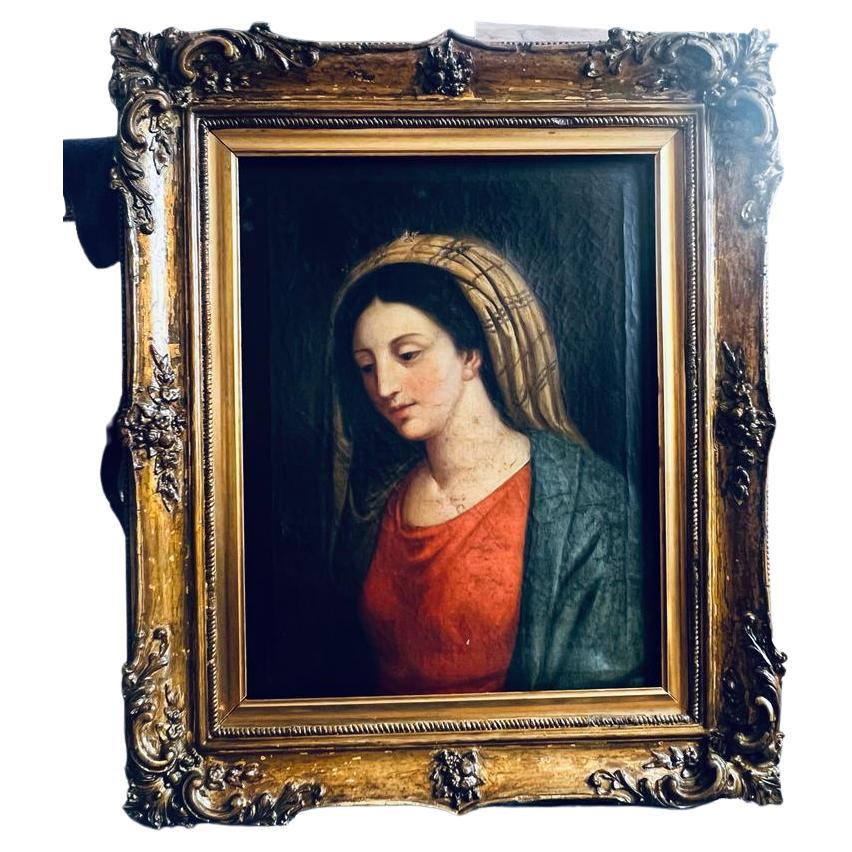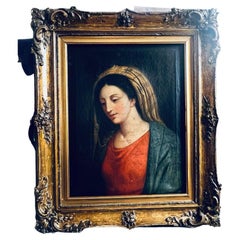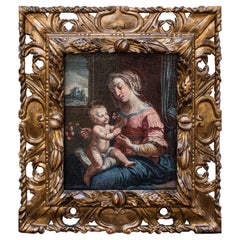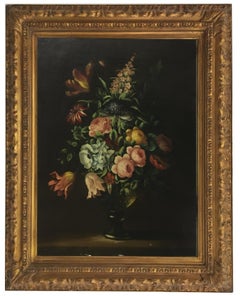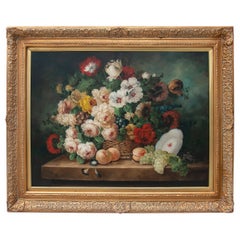Items Similar to Flower Garland Virgin Paint Oil on canvas Old master 17th Century Italy
Want more images or videos?
Request additional images or videos from the seller
1 of 17
Flower Garland Virgin Paint Oil on canvas Old master 17th Century Italy1640- 1680
1640- 1680
$5,559.39
$6,949.2320% Off
£4,137.83
£5,172.2920% Off
€4,640
€5,80020% Off
CA$7,614.97
CA$9,518.7120% Off
A$8,469.51
A$10,586.8920% Off
CHF 4,422.51
CHF 5,528.1420% Off
MX$103,064.91
MX$128,831.1320% Off
NOK 56,482.25
NOK 70,602.8220% Off
SEK 52,970.39
SEK 66,212.9820% Off
DKK 35,322.70
DKK 44,153.3820% Off
Shipping
Retrieving quote...The 1stDibs Promise:
Authenticity Guarantee,
Money-Back Guarantee,
24-Hour Cancellation
About the Item
Giovanni Stanchi (Rome 1608 - 1675) or Niccolò Stanchi (Rome 1623 - 1690), workshop of
GARLAND OF FLOWERS WITH PORTRAIT OF THE VIRGIN
Rome, First half of the Seventeenth century
oil on canvas, cm. 73 x 59
framed cm. 98 x 82
The examined painting is to be ascribed to the production of Giovanni Stanchi's atelier (Rome 1608 - 1675); The 'Stanchi' (the founder Giovanni, together with the brothers Niccolò and Angelo) constituted one of the most fervent still life workshops in Baroque Rome starting from 1630, sought after by the most important families of the aristocracy, from the Colonna, to the Chigi, to the Rospigliosi , and present since the end of the century in the Medici collections.
Their production, extremely varied in type but coherently stylistic, can be subdivided according to the subjects proposed: first of all the garlands, of which the proposed canvas represents an example of quality, linked to the Flemish model made famous in Rome by Daniel Seghers, and probably largely related to Giovanni; The style of the work may well approach the works of Niccolò, active in Rome for almost the entire seventeenth century, younger brother and owner of the workshop after Giovanni's death.
As for the portrait of the Virgin at the center of the garland, it must be said that, in this type of composition, the figures were often entrusted to a specialized painter, different from the painters of flowers. Carlo Maratta, for example, often collaborated with some important workshops, including Stanchi and Mario Nuzzi, completing their floral compositions with his religious subjects (see details).
This is the case, by way of example, of the magnificent mirrors performed by Giovanni Stanchi in 1670 for the gallery of Palazzo Colonna in collaboration with Carlo Maratta (Garland of flowers with four cherubs; and Vase of flowers with five cherubs), in competition with Mario dei Fiori, author of the other two; as for Nicolò, the younger brother who owned the shop after Giovanni's death, the mirrors in the Borghese palace, executed in 1675 in collaboration with Ciro Ferri.
CONSERVATION Our flower composition stands out for its bright colors and excellent preservation
Like all our objects, the work is sold with a certificate of photographic authenticity in accordance with the law.We handle and organize the transport of the purchased works, both for Italy and abroad, through professional and insured carriers.
Contact us for any information, we will be happy to answer you.
- Creation Year:1640- 1680
- Dimensions:Height: 38.59 in (98 cm)Width: 32.29 in (82 cm)
- Medium:
- Movement & Style:
- Circle Of:Giovanni Stanchi (1608 - 1675, Italian)
- Period:
- Condition:
- Gallery Location:Riva del Garda, IT
- Reference Number:1stDibs: LU98815507102
About the Seller
4.9
Platinum Seller
Premium sellers with a 4.7+ rating and 24-hour response times
Established in 2017
1stDibs seller since 2018
255 sales on 1stDibs
Typical response time: <1 hour
- ShippingRetrieving quote...Shipping from: Riva del Garda, Italy
- Return Policy
Authenticity Guarantee
In the unlikely event there’s an issue with an item’s authenticity, contact us within 1 year for a full refund. DetailsMoney-Back Guarantee
If your item is not as described, is damaged in transit, or does not arrive, contact us within 7 days for a full refund. Details24-Hour Cancellation
You have a 24-hour grace period in which to reconsider your purchase, with no questions asked.Vetted Professional Sellers
Our world-class sellers must adhere to strict standards for service and quality, maintaining the integrity of our listings.Price-Match Guarantee
If you find that a seller listed the same item for a lower price elsewhere, we’ll match it.Trusted Global Delivery
Our best-in-class carrier network provides specialized shipping options worldwide, including custom delivery.More From This Seller
View AllAngels Floral Garland Maratta Paint Oil on table Old master 17th Century Italian
Located in Riva del Garda, IT
Pair of angels with floral garland and cartouche with family motto 'Pulchriora latent'
Workshop of Carlo Maratta (Camerano, 1625 - Rome, 1713)
Dated on parchment, right: 1697
oil on the table (94 x 84cm./ in frame 105 x 95 cm.)
This magnificent composition, depicting two little fluttering cupids intent on holding up a garland of flowers, can be traced back, both for the stylistic characteristics and for the compositional taste, to a master active in the fervid seventeenth-century Baroque Rome.
One of the two cupids is about to grab the bow of the garland with his head facing downwards, while with the other hand he shows a parchment which bears, in addition to the date of execution, the Latin expression "Pulchriora latent" ("The the most beautiful things...
Category
17th Century Old Masters Paintings
Materials
Oil
$9,843 Sale Price
25% Off
Flower Still-life Virgin Trevisani Stanchi Paint Oil on canvas 17/18th Century
By Francesco Trevisani (Capodistria 1656 - Rome 1746)
Located in Riva del Garda, IT
Flower garland with a portrait of the Virgin
Francesco Trevisani (Capodistria 1656 - Rome 1746) and Niccolò Stanchi (Rome 1623 - 1690), attributable
Oil on canvas
66 x 49 cm. - In f...
Category
18th Century Old Masters Still-life Paintings
Materials
Oil
$5,607 Sale Price
20% Off
Flowers Paint Oil on canvas Old master 17th Century Italy Still-life Art
Located in Riva del Garda, IT
Master of the Grotesque Vase (active in Rome and Naples in the first quarter of the 17th century)
Still life of flowers in a classic vase
oil on canvas
66 x 51 cm, In frame cm. 82 x...
Category
17th Century Old Masters Paintings
Materials
Oil
$8,348 Sale Price
20% Off
Angels Flower Garzi Paint Oil on canvas Old master 17/18th Century Italian Art
By Luigi Garzi (Pistoia 1638– Rome1721)
Located in Riva del Garda, IT
Roman school of the early 18th century
Luigi Garzi (Pistoia 1638– Rome1721) attributed
Still life of fruit supported by three angels
Oil on oval canvas
116 x 91 cm., Framed 140 x 119 cm.
Authentication on a photograph by Prof Giancarlo Sestieri, who attributes the work to the sphere of Luigi Garzi
This magnificent canvas, depicting a sumptuous composition of fruit supported by three prosperous winged cherubs, from which comes a parchment bearing the Latin expression "Amor est vitae essentia", is to be placed in the production of a Roman author active between the second half of XVII century and the first of the following century.
The iconography that sees represented cherubs with fruit or flowers is frequent in the Baroque period, especially in the Roman area, starting from the 1600s, with that particular depictional tendency aimed at illusionistic and frivolous images, to a type of paintings or frescoes of strong value decorative, intended for the private context and depicting jubilation of cherubs, angels or cherubs, and of which our canvas represents a perfect example.
We can recall, among the most illustrious iconographic precedents, the elegant mirrors painted by Mario Nuzzi and Carlo Maratta that adorn the hall of Palazzo Colonna in Rome, and again the canvas preserved in the Rouen museum and the similar ones in Palazzo Chigi in Ariccia, with the collaboration for the figurative parts of Filippo Lauri.
The commercial and furnishing success of similar works is also testified by authors such as Guglielmo Cortese known as Borgognone (1628 - 1679), Franz Werner Von Tamm (1658 - 1724), Giovan Battista Gaulli (1639 - 1709), Giovanni Paolo Castelli known as Spadino (Rome 1650 - 1740) and the aforementioned Carlo Maratta (1625 - 1713)
The work, studied by Giancarlo Sestieri, was brought closer to the sphere of the eclectic Pistoian painter Luigi Garzi, one of the protagonists of Roman painting in the decades of transition between the seventeenth and eighteenth centuries. In our painting we can find the typical elements of his painting: the soft and delicately chiaroscuro light, the sculptural classicism of the figures as well as the stupendous luministic and chromatic effects.
Luigi Garzi's training and artistic activity took place in the Eternal City and he was in effect a Roman artist. He moved to Rome from Pistoia, his hometown at a very young age, and joined the atelier of Andrea Sacchi, who directed his studies towards classicism, comparing himself with the works of Raphael, Domenichino and Nicolas Poussin, but also with the Emilian one. , with particular attention to the school of Guido Reni.
But the Emilian examples were undoubtedly preceded, particularly by Giovani Lanfranco, who modeled his taste and style, together with a modulated cortonism, while those pre-eighteenth-century sensibilities are due to the lesson of Carlo Maratta.
However, there is no doubt that the painter oriented his personality without ever bowing to imitation, reaching a refined elegance and autonomy of language, as the canvas in question clearly demonstrates in which the different influences find a refined amalgamation in perfect harmony with the baroque evolution between the seventeenth and eighteenth centuries, indicating a dating to its earliest maturity.
These attitudes led the painter to obtain awards and prestigious commissions as soon as possible, such as the frescoes of Palazzo Borghese...
Category
Late 17th Century Old Masters Paintings
Materials
Oil
$14,952 Sale Price
20% Off
Still-life Flower Paint Oil on canvas Old master 17th Century Lombard school
Located in Riva del Garda, IT
Francesca Volò Smiller, called Vincenzina (Milan, 1657 - 1700) - circle of
Floral composition
Oil on canvas (97 x 72 cm. - in octagonal frame 100 x 84 cm.)
A rich floral compositio...
Category
17th Century Old Masters Paintings
Materials
Oil
$5,607 Sale Price
20% Off
Flowers Still-life Scacciati 17th Century Paint Oil on canvas Old master
Located in Riva del Garda, IT
Andrea Scacciati (Florence 1642-1710)
Composition of flowers within embossed vase (1 of 3)
oil on canvas
130 x 90 cm
In antique frame 145 x 105 cm.
Work with expertise by Prof. Emi...
Category
17th Century Old Masters Paintings
Materials
Oil
$13,706 Sale Price
20% Off
You May Also Like
Antique 17th Century Painting Madonna /Virgin Mary Italy Oil on Canvas
Located in Doha, QA
Magnificent Italian 17th century Portrait of Virgin Mary measures 52 x 68 cm without the frame.
The colors are stunning and the paintin...
Category
Antique 17th Century Italian Baroque Paintings
Materials
Canvas
16th Century Madonna of the Carnations Painting Oil on Canvas from Raffaello
By Raphael (Raffaello Sanzio da Urbino)
Located in Milan, IT
16th century, by Raffaello Sanzio (Urbino, 1483 - Rome, 1520)
Madonna of the Carnations
Measures: Oil on canvas 38 x 30 - with frame 59 x 52.5 cm
The Madonna dei Garofani made b...
Category
Antique 16th Century Italian Paintings
Materials
Canvas
FLOWERS - In the Manner of J.B. Monnoyer - Oil on Canvas Italian Painting
By Carlo De Tommasi
Located in Napoli, IT
Flowers - Carlo De Tommasi Italia 2010 - Oil on canvas cm. 80x60
Gold leaf gilded wooden frame cm.106x86
This wonderful painting inspired by Jean Baptiste Monnoyer, shows a vase with...
Category
Early 2000s Old Masters Still-life Paintings
Materials
Canvas, Oil
Decorative Hand-Painted Painting of Flowers in Oil on Canvas with Golden Frame
Located in Marbella, ES
Decorative Hand-Painted Painting of Flowers in Oil on Canvas with Golden Frame
Measurements with frame: 105x128x8cm
Category
Late 20th Century European Paintings
Materials
Canvas, Wood
FLOWERS - Carlo De Tommasi - Still Life Oil on Canvas Italian Painting
By Carlo De Tommasi
Located in Napoli, IT
Flowers - Carlo De Tommasi Italia 2007 - Oil on canvas cm. 80x50. With frame cm. 100x70
Frame available on request from our workshop.
In this precious oil painting, Carlo De Tommasi ...
Category
Early 2000s Old Masters Still-life Paintings
Materials
Canvas, Oil
Penitent Mary Magdelane c1750 Oil on Copper
Located in Holywell, GB
A finely painted picture, possibly of the penitent Mary Magdelane, painted in oil on to a copper plate and dating to c1750.
Condition
Two old touch ins, tiny chip to the forehead...
Category
1750s Old Masters Figurative Paintings
Materials
Oil
More Ways To Browse
Flower Vase Oil On Canvas
Painting Of The Virgin
Medici Art
Old Master Flemish
Old Master Flower Painting
Old Master Painting Flemish
Old Religious Painting
Medici Painting
Flemish Flower Painting
17th Century Religious Paintings
Old Masters Religious Paintings
Painting With Cherubs
Seventeenth Century Paintings
Antique Cherub Painting
Old Medici
Religious Oil Painting 17th Century
Floral Old Masters
17th Century Cherub
